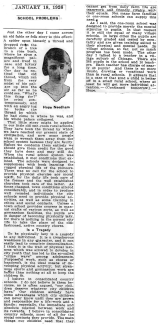Just the other day I came across an old fable or folk story to this effect: A spider spun himself a thread and dropped from the branch of a tree to a rose bush, where he spun a magnificent palace and lived in ease and luxury for a long time. One day he noticed that old thread, which ran from the very midst of his palace up into the air as far as he could see. "What's this thing for?" he cried contemptuously, and with an angry tug he broke the thread cry which he had come to where he was, and his whole palace collapsed.
That little story might be applied to our little old one-room rural schools. They have been the thread by which we have reached our present state of civilization, and now some people want to wrench them away from the school system because they are faulty. Before we condemn them entirely we should give them credit for the good they have done and may still do. When the rural school system was established, it met conditions that existed. The schools were designed to supplement with book learning the rugged physical life of the pioneers. There was no call for the school to provide physical exercise nor moral uplift, fo rah daily life took care of the former and the well established churches took care of the latter. As times changed, town conditions altered considerably, and in order to produce well rounded individuals the city schools need to provide physical activities, as well as some training in this and social contacts. Unless a town school provides courses in manual crafts of various sorts, as well as gymnasium facilities, the pupils are in danger of become physically lazy for there is nothing in the normal city life to take the place of the old-fashioned, active country chores.
Is a Tragedy
To be physically lazy is a tragedy to any individual. It is a treacherous weakness in any character, and it can easily lead to complete demoralization. I think it is the trait of physical laziness which was allowed to develop in city youth that has led to the so-called "crime wave" among adolescents. Purposeful work, such as chores or handcraft, is the ideal means of developing physical activity; but strenuous sports and gymnasium work are better than nothing at all to keep the children fit.
I believe in consolidated country schools. I do not believe in them because, as is often argued, "our children deserve whatever city children have." Our children already have some advantages which city children can never know until they are grown and responsible for a life-work and a family; especially, the immediate and absolute relation between work and its rewards. I believe in consolidated country schools, most of all for the social contacts they provide. The main things our children need that they cannot get from daily Fram life are teamwork and friendly rivalry with their equals. Not many farm families or one-room schools can supply this need.
As I said, the one-room school was designed to provide merely the mental stimulus to pupils. In that respect it is still the equal of many village schools. In large cities the pupils are carefully graded and tested by mentality and are given training suited to their physical and mental needs. In village schools, so far, not so much progress has been made. The other day I talked to a teacher in a village suburb of Chicago. There are 385 pupils in the school and 10 teachers. Each teacher has charge of nearly 40 pupils! And there is no more music, drawing or vocational work than in rural schools. It appears that in a case of that kind a child is better off in a small rural school, where at least he will get more individual attention. (Continued tomorrow) --Hope

